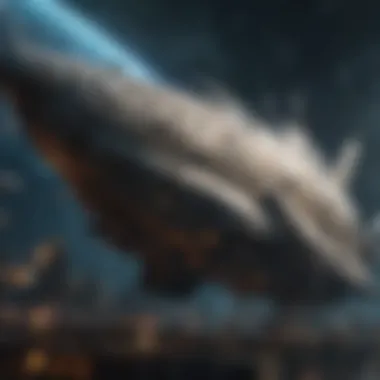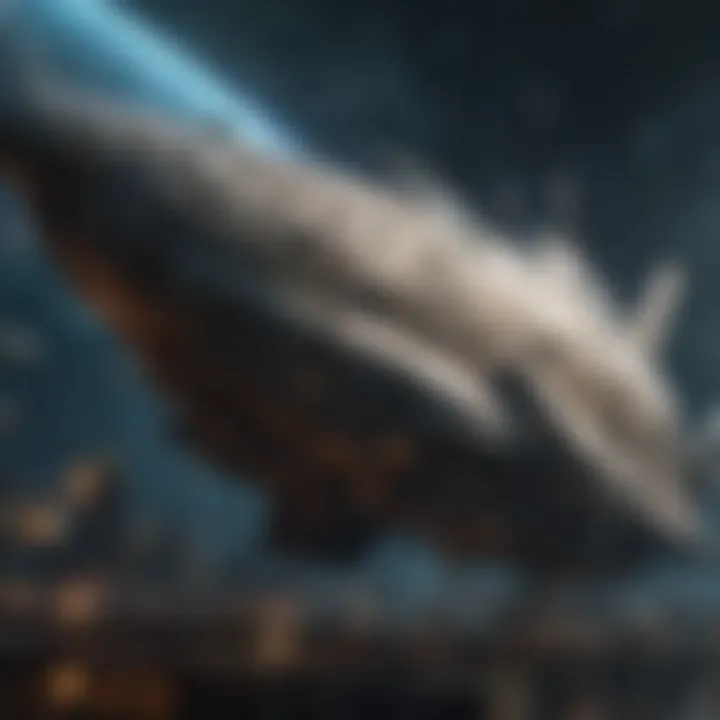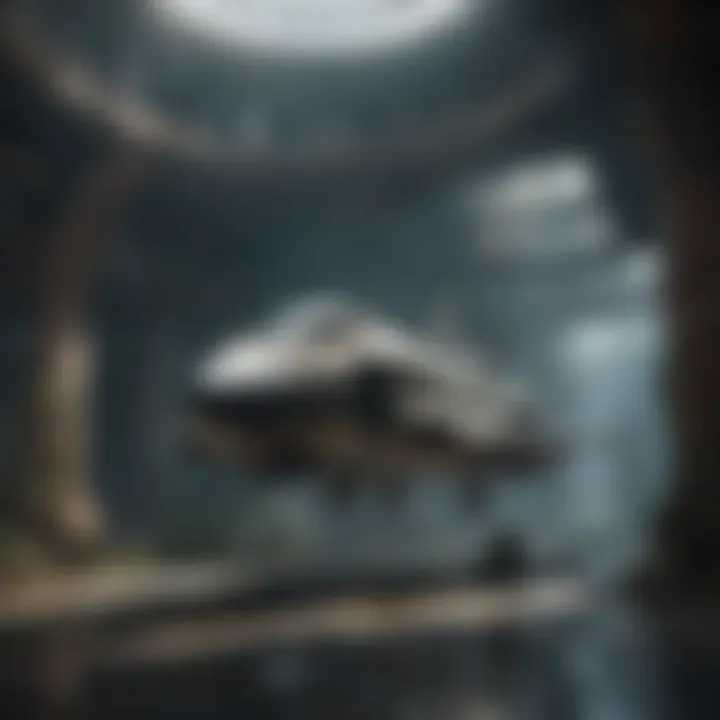Exploring the Scientific Significance of Atlantis T3


Intro
The subject of Atlantis T3 continues to intrigue scholars, students, and enthusiasts alike. This article aims to provide a comprehensive understanding of the scientific significance of Atlantis T3. It explores various facets of this enigmatic entity in detail, highlighting its implications in multiple academic fields. By examining archaeological, geological, and cultural aspects, this work seeks to illuminate the connection between ancient civilizations and contemporary scientific discussions.
The relevance of Atlantis T3 cannot be overstated. In today’s world, where myths and historical narratives often intertwine, it is crucial to delve beneath the surface and analyze the facts. This exploration not only satisfies scholarly curiosity but also serves to enrich our understanding of human history. Through an investigation of both existing theories and recent discoveries, a nuanced portrayal of Atlantis T3 emerges, bridging the gap between myth and reality.
Research Overview
Summary of Key Findings
Atlantis T3 presents a fascinating case for researchers. Recent excavations and analyses have yielded data suggesting its possible role as a significant ancient civilization. Archaeological findings, including artifacts, structures, and inscriptions, hint at a complex society that might have thrived long ago. The geological aspect further complicates our understanding. Evidence indicates that natural disasters could have contributed to the decline or demise of this society.
To put it simply, the key findings can be summarized as follows:
- Discovery of ancient artifacts aligning with descriptions from historical texts.
- Geological studies revealing possible catastrophic events linked to Atlantis T3.
- Cultural analysis showcasing the influences of other contemporary civilizations.
Importance of the Research in Its Respective Field
The research surrounding Atlantis T3 has far-reaching implications. In archaeology, it challenges traditional narratives about ancient civilizations. In geology, it sheds light on the relationship between environmental changes and societal development. Lastly, in cultural studies, it serves as a case study for understanding human adaptation and myth-making.
The implications are plentiful. Understanding Atlantis T3 not only adds another layer to our knowledge of ancient societies but also provides a framework for evaluating how myths are formed and perpetuated over time.
"In the pursuit of knowledge, understanding the past is as important as predicting the future."
Methodology
Description of the Experimental or Analytical Methods Used
The methodologies applied in researching Atlantis T3 are diverse and interdisciplinary. Field excavations are paired with advanced analytical techniques, such as radiocarbon dating and stratigraphy. These methods allow researchers to establish timelines and contextualize findings within appropriate historical frameworks.
Other analytical methods include:
- Geographic Information System (GIS) mapping to visualize site layouts.
- Chemical analysis of artifacts to determine their origins and uses.
- Survey techniques to assess the extent of underground structures.
Sampling Criteria and Data Collection Techniques
Data collection follows strict criteria to ensure reliability. The selection of sites for excavation is based on previous scholarly work and the presence of significant findings. Sampling techniques involve systematic stratified sampling, which provides representative data across different excavation layers.
Data types collected include:
- Physical artifacts (tools, pottery, etc.)
- Geological samples
- Historical documents and texts related to the myths of Atlantis
Such rigorous methods contribute to a well-rounded understanding of Atlantis T3, laying a strong foundation for further exploration and study.
Foreword to Atlantis T3


The topic of Atlantis T3 is significant in unraveling the complexities surrounding ancient civilizations. This section aims to set the stage for understanding Atlantis's broader implications in archaeology, geology, and cultural studies. By reviewing the historical and conceptual background of Atlantis T3, we can appreciate how it influences contemporary scientific discourse. It is crucial to recognize that the discussion of Atlantis is not just about myth but also about the search for truth in historical narratives.
Historical Overview of Atlantis
The legend of Atlantis dates back to ancient texts, most notably those by Plato. In these texts, Atlantis is described as a powerful and advanced civilization that eventually fell out of favor with the gods, leading to its destruction. Over centuries, various interpretations have emerged regarding its existence and location. Some scholars argue that Atlantis may be an allegory crafted by Plato to discuss moral and philosophical themes, while others maintain it was based on real events or places. The story of Atlantis has spurred debates, research, and exploration aimed at uncovering potential evidence of such a civilization.
Researchers have explored diverse regions, from the Mediterranean to the Caribbean, searching for remnants of Atlantis. Some propose links to the Minoan civilization on Crete, suggesting its advanced culture influenced the Atlantis myth. Others even consider hypotheses about lost continents, adding more layers to the conversation about this enigmatic entity. Thus, the historical overview reveals how Atlantis serves as a crucial point of reference in discussions about ancient societies.
Defining Atlantis T3
Defining Atlantis T3 requires a clear communication of ideas. While the original concept of Atlantis captures attention with grandiosity, Atlantis T3 represents an adaptation of these ideas for modern scholarship. Atlantis T3 reflects current scientific understanding while also recognizing historical interpretations. It merges archaeological, geological, and mythological studies into a framework for understanding broader narratives surrounding ancient civilizations.
In essence, Atlantis T3 moves beyond historical texts to engage with concrete evidence, questioning previous assumptions. This model encourages a fresh perspective on how societies interacted with their environments, providing a multidimensional view that unpacks the complexities of ancient life. By reassessing these elements, Atlantis T3 becomes pivotal to our understanding of historical continuity and change.
Purpose of the Article
The purpose of this article is to analyze and synthesize the existing knowledge surrounding Atlantis T3 while addressing its significance in modern research. Given the extensive lore and speculation associated with Atlantis, this piece aims to offer readers a balanced view of myths versus reality. By critically examining contemporary scholarship, the article reveals the importance of interdisciplinary approaches in studying this topic.
Furthermore, the article caters to a diverse audience, including students, researchers, and educators. It seeks to enhance comprehension by highlighting key points and fostering a better understanding of how Atlantis T3 contributes to ongoing debates in various fields. This exploration is relevant not only for historical inquiry but also for contemporary discussions about humanity's past and its connection to present-day cultural, geological, and archaeological narratives.
Scientific Context of Atlantis T3
The exploration of Atlantis T3 necessitates a clear understanding of its scientific context. This framework serves as a bridge between historical narratives and contemporary scientific inquiry. The study of Atlantis has captivated minds for centuries, often oscillating between skepticism and fascination. Addressing the scientific aspects of Atlantis T3 allows researchers to evaluate geological and archaeological evidence critically while considering the implications of myths within ancient civilizations.
Understanding the scientific context acknowledges the multifaceted dimensions of Atlantis T3. This involves an examination of historical texts, cultural perspectives, and the distinctions between myth and reality. Such insights can illuminate how our current comprehend of science and history may influence future interpretations. More importantly, it allows us to analyze traditional beliefs through a modern lens, enriching the discourse surrounding ancient myths.
Ancient Civilizations and Their Myths
Ancient civilizations crafted stories that were not only entertaining but also rich in meaning. The tale of Atlantis is one such myth, originating from the narratives of Plato. These stories served to convey moral lessons, cultural values, and ideas of civilization. Through the lens of mythology, we observe how societies explain their existence and encode their experiences. The tale of Atlantis reflects a yearning for a lost golden age, marking the duality of civilization's capabilities and its eventual collapse.
By examining myths, we can apply a contextual analysis that involves history, socio-political climate, and environmental factors. Myths are often embellished accounts that encapsulate the values and fears of a civilization. Atlantis may symbolize the heights of human achievement and the looming threat of hubris. Understanding these undercurrents is essential in evaluating the potential reality of Atlantis T3.
Geological Evidence for Atlantis
Geological evidence is crucial to supporting or debunking the existence of Atlantis T3. Various researchers have proposed locations based on tectonic plate activity, sediment deposits, and underwater geological formations. For instance, the Mediterranean region has garnered attention due to unusual seafloor features that resemble ancient landforms. Scientific drilling and analysis may reveal information about ancient civilizations and their interactions with their environments.
Studies have also focused on patterns of catastrophic geological events, such as tsunamis and earthquakes, which could explain the sudden disappearance of a landmass. Understanding these phenomena is paramount for assessing how geological activity may correlate with mythic accounts of Atlantis. The ongoing exploration of oceanic features thus presents a compelling base for future inquiries.
Archaeological Discoveries
Archaeological findings present tangible evidence that can ground theories in physical reality. Over the years, various sites have been investigated, yielding artifacts that suggest advanced societies existed in ancient times. For example, sites in the Aegean and the Caribbean have revealed structures and settlements that signify significant cultural accomplishments. While none of these discoveries have conclusively identified Atlantis, they do support the idea of advanced civilizations prior to mainstream historical records.
Artifacts, inscriptions, and urban arrangements discovered in these sites allow scientists to draw parallels with descriptions of Atlantis as a formidable society. Examining the evidence from an archaeological perspective not only offers insights into the potential reality of Atlantis but also into how cultures evolve and intersect over time. The layered histories found in these sites enrich our understanding of human development and collective memory.
"The lines between myth and history are often blurred, shaped by the roles society assigns to them."


In summary, the scientific context surrounding Atlantis T3 encapsulates various approaches, each contributing to our understanding. The intersection of mythology, geology, and archaeology not only brings depth to the narrative but also challenges us to reconsider ancient tales, searching for kernels of truth within the fabric of history.
Theoretical Frameworks Surrounding Atlantis T3
The topic of theoretical frameworks surrounding Atlantis T3 is pivotal in developing a thorough understanding of its significance. This section emphasizes the various lenses through which Atlantis can be viewed and analyzed. Understanding these frameworks assists in deconstructing myths, interpreting archaeological data, and evaluating the cultural impact of Atlantis in various fields. The frameworks offer a structured approach to studying the topic, enhancing both the intellectual rigor and the interpretive depth of the discussion. They illuminate the multi-faceted nature of Atlantis T3 and suggest that its implications extend far beyond a mere mythological tale.
Myth versus Reality: A Critical Analysis
The relationship between myth and reality regarding Atlantis T3 is complex. Myths often adapt over time, shaped by cultural narratives and societal values. The critical analysis of these connections offers insights into how such stories develop and evolve.
"Myths reflect collective beliefs and fears, filtered through time and storytelling,"
a notion pivotal in the study of Atlantis.
Analyzing myth allows researchers to discern broader truths about ancient societies. It reveals how societies grappled with concepts like civilization, morality, and catastrophe. For example, Plato's accounts of Atlantis serve not just as historical narratives but also philosophical explorations of human behavior. The contrast between idealized civilization and eventual decline resonates throughout history. An informed approach to deciphering these stories highlights the broader questions faced by modern society, particularly in terms of resilience and adaptation in the face of societal pressures.
Modern Interpretations of Atlantis
In contemporary discussions, Atlantis T3 has been interpreted through various lenses including philosophy, science, and even politics. Scholars and creators have drawn from the Atlantis tales to comment on modern society’s issues. From Utopian ideals to cautionary tales about environmentalism, the interpretations are diverse.
One notable interpretation involves seeing Atlantis as a critique of contemporary civilization. The idea of a lost civilization serves as a metaphor for the potential consequences if societies ignore ethical accountability and environmental stewardship. Additionally, popular culture often utilizes Atlantis to portray advanced technology or knowledge that is lost, speaking to the human fascination with lost wisdom.
Interdisciplinary Approaches
An interdisciplinary approach to the study of Atlantis T3 combines insights from archaeology, history, geology, and cultural studies. These fields collaborate to create a more nuanced view, allowing for a broader inquiry into what Atlantis represents.
- Archaeological Insights: Excavations and findings contribute to tangible evidence, proposing whether a historical element exists.
- Geological Perspectives: Studies concerning possible geographical origins provide a scientific grounding, questioning theories of submergence.
- Cultural Studies: Contextualizing Atlantis within cultural narratives reveals its persistent relevance in artistic and literary traditions.
By integrating these diverse perspectives, researchers can construct a more complex understanding of Atlantis T3, acknowledging both its mythical and potentially historical components. This synthesis not only enriches academic discourse but also aids in further exploration of ancient civilizations and their legacies.
Cultural Impact of Atlantis T3
The cultural impact of Atlantis T3 extends far beyond mere myth. It acts as a prism through which various fields converge, each adding layers of significance. By examining how the concept of Atlantis has influenced creativity, belief systems, and philosophical inquiries, one begins to understand its enduring relevance.
Often viewed as a symbol of lost knowledge and advanced civilization, Atlantis invokes curiosity and speculation. The themes related to Atlantis provoke discussions about human potential and the consequences of societal hubris. This far-reaching influence signifies the power of narrative in shaping cultural consciousness.
Influence on Art and Literature
Art and literature have been significantly impacted by the idea of Atlantis. Numerous authors, poets, and artists have drawn inspiration from the myth, using it as a tool to explore themes of civilization and its inevitable decline. For example, Plato's dialogues are foundational texts that stimulated discussions about morality, governance, and philosophy layered within the tale of Atlantis.
In modern literature, titles like "The Lost World" by Arthur Conan Doyle and "Atlantis Gene" by A.G. Riddle embody the allure of this ancient civilization. These works illustrate how Atlantis serves as a backdrop for human exploration and ethical deliberation.
Moreover, visual arts have embraced the aesthetic of Atlantis. Artists like Jules Vernes and H. R. Giger depict imagined scenes that resonate with the ideals of beauty and tragedy. These representations reflect how artists grapple with the ideas that Atlantis represents—potential lost through inaction and the quest for knowledge.
Atlantis in Popular Culture
The Atlantis narrative continues to thrive in modern media. Films such as Disney's "Atlantis: The Lost Empire" and series like "Stargate Atlantis" have brought the concept to mainstream audiences. These portrayals not only entertain; they also ignite discussions about discovery and cultural identity.


"Atlantis reflects our collective imagination, driving curiosity about the past while igniting future possibilities."
Additionally, video games such as "Assassin's Creed: Odyssey" and "BioShock" seamlessly blend the mythos of Atlantis into play, allowing players to explore and interact with these imaginative landscapes. This fusion of technology and storytelling further cements Atlantis's place in popular culture, engaging a younger audience while stirring questions about history and morality.
Philosophical Implications
The philosophical implications of Atlantis T3 warrant serious consideration. The narrative embodies various moral lessons and historical warnings. As a metaphor, Atlantis may signify the risks of losing connection with our values or failing to heed the consequences of technological advancement.
Many philosophers have used the Atlantis myth to dissect human nature and sociopolitical structures. It serves as a foundation for debates about the ideal society, government corruption, and environmental sustainability. By examining the downfall of Atlantis, contemporary thinkers reflect on today's societal challenges.
In summary, the cultural impact of Atlantis T3 connects many aspects of human thought, from artistic expression and popular media to profound philosophical reflection. Its transcendence beyond the original tale demonstrates the unique ability of myths to enlighten, caution, and inspire.
Epilogue
The conclusion articulates the importance of the discussions presented throughout the article. It serves as a synthesis of various threads explored regarding Atlantis T3. This encompasses its archaeological significance, geological findings, and cultural implications. By summarizing these aspects, the conclusion emphasizes how they collectively enrich our understanding of ancient civilizations and the enduring allure of Atlantis.
Moreover, the closing section reiterates the critical aspects that contribute to contemporary dialogues around mythology and reality. It highlights the role of Atlantis T3 as not mere legend but as a significant point of analysis for scholarly inquiry. Through examining varying interpretations and engaging with empirical evidence, the narrative beckons for a more nuanced perspective on ancient myths.
Summarizing Key Points
In this section, we distill the main themes discussed:
- Scientific Significance: Atlantis T3 represents a vital intersection of archaeology, geology, and cultural studies, shedding light on lost civilizations and their narratives.
- Research Progress: The article discusses how recent findings have added depth to our understanding of the myth of Atlantis, influencing modern interpretations.
- Cultural Influence: The impact of Atlantis on philosophy, literature, and popular culture is noted, tracing its legacy through centuries.
- Interdisciplinary Nature: The discussions indicate how various fields contribute to the ongoing debate surrounding the myth versus reality argument, enriching scholarly discourse.
Future Directions for Research
Identifying future research avenues is essential for further exploration of Atlantis T3. Here are several potential directions:
- Advanced Archaeological Techniques: Employing cutting-edge technology in archaeological digs could uncover more artifacts related to Atlantis, solidifying or challenging current narratives.
- Geological Studies: Continued geological assessments of areas proposed as the possible location of Atlantis could yield significant evidence, helping to clarify its historical basis.
- Cultural Analysis: An in-depth examination of how different cultures interpret the Atlantis myth can yield insights into human psychology and mythology.
- Interdisciplinary Collaborations: Encouraging greater collaboration between historians, archaeologists, and scientists can enrich the understanding of Atlantis, paving pathways for innovative methodologies and interpretations.
This conclusion reaffirms the relevance of Atlantis T3 in the realms of academia and culture. It is clear that while the Atlantis narrative may spark curiosity, its examination leads to a broader appreciation of human history and storytelling.
Cited Works
In this article, we draw upon a variety of academic sources to solidify our claims. Notable among them are works such as Plato's dialogues, which originally documented the tale of Atlantis. Additionally, modern archaeological papers and geological studies offer fresh perspectives and data that help to expand understanding.
Here is a list of some prominent cited works:
- Plato. Critias. 360 BC.
- Schliemann, Heinrich. Troy and its Remains. 1875.
- Cayce, Edgar. A Search for Atlantis. 1968.
- Taylor, John. The Atlantis Blueprint. 2005.
The integration of academic citations in research solidifies arguments and provides a stronger foundation for claims.
Further Reading
For individuals keen on understanding the depths of Atlantis T3 and its scientific implications, further reading is highly recommended. It allows researchers and interested readers to explore perspectives that may not be covered in depth within this article. Useful starting points could include:
- Castleden, Ray. The Atlantis Solution. 2004.
- Hutton, James. Theory of the Earth. 1788.
- Hawass, Zahi, and Saleem, Ahmad. The Lost City of the Pharaohs. 2009.
Online resources also offer a breadth of pathways to explore:
These references and further reading suggestions provide a framework for understanding the ongoing discussions and research surrounding Atlantis T3, highlighting its relevance across various fields of study.







